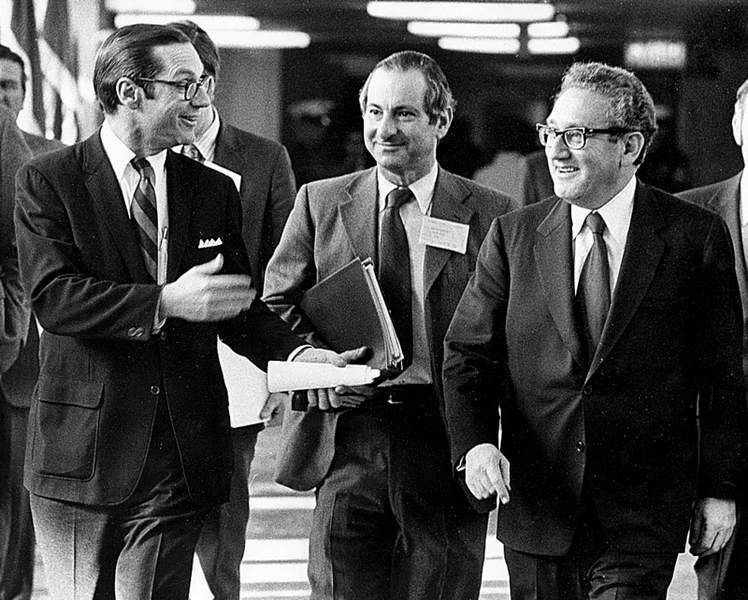Helmut Sonnenfeldt, known as ‘Kissinger’s Kissinger’
Published 4:00 am Friday, November 23, 2012

- Helmut Sonnenfeldt is flanked by William Simon, left, and Secretary of State Henry Kissinger in 1974. Sonnenfeldt died Sunday at age 86.
Helmut Sonnenfeldt, an expert on Soviet and European affairs who was known as “Kissinger’s Kissinger” for his influence in advising Henry Kissinger, the architect of U.S. foreign policy in the Nixon and Ford administrations, died Sunday in Chevy Chase, Md. He was 86.
The cause was complications of Alzheimer’s disease, his wife, Marjorie, said.
In an interview Wednesday, Kissinger, who was national security adviser and secretary of state under President Richard Nixon and secretary of state under Gerald Ford, called Sonnenfeldt “my closest associate” on Soviet-American relations.
“He was at my right hand on all the negotiations I conducted with the Soviets,” including arms control talks, Kissinger said.
Sonnenfeldt produced “thoughtful and penetrating papers” on Russian intentions in the Middle East and the Helsinki Accords on human rights, among other issues, Kissinger said. It was a period of easing tensions between the superpowers, despite the war in Vietnam.
Few doubted Sonnenfeldt’s importance, but because he was behind the scenes his influence was not usually visible to the public eye. In 1973, The New York Times called him “one of the least known men in the Nixon administration.”
Kissinger and Sonnenfeldt had much in common. Both were native Germans and scholars of international affairs who had been educated in the United States. They met as soldiers in the U.S. Army. After the war, Kissinger pursued a career in academia and research organizations, while Sonnenfeldt worked in government, rising in the State Department.
The two remained friends, and days after Nixon was elected, Kissinger persuaded him to transfer Sonnenfeldt to the National Security Council staff. But their unequal status led to tensions.
In an interview on Wednesday, Kalb, who knew both men well, called their relationship “subdued but contentious.”
In “Kissinger: A Biography,” Walter Isaacson wrote in 1992 that Sonnenfeldt had resented being treated as if he were a Kissinger staff member rather than as “an official in his own right who deserved independent access to the president.” He quoted Sonnenfeldt as characterizing Kissinger’s behavior as “a manifestation of his insecurity.”
In his 2000 book, “Years of Renewal,” Kissinger wrote that Sonnenfeldt had carefully watched the comings and goings from Kissinger’s office and that when someone involved with Russian and Eastern European policy appeared, he would hustle to join the meeting.
“Hal has the best intelligence system in town,” Kissinger quoted an aide as saying, using a familiar name for Sonnenfeldt. “Unfortunately, it’s aimed at you.”
But on Wednesday, Kissinger dismissed speculation that there had been jealousy between the men, calling it “silly” but probably inescapable.
“Look, I was a secretary of state,” he said. “He was a counselor.”
Helmut Sonnenfeldt was born in Berlin on Sept. 13, 1926. In 1938, his parents, Jewish doctors, sent him and his brother, Richard, to an English boarding school set up for youths who had fled Nazi Germany. The parents passed through Sweden before emigrating to the United States, where they were reunited with their sons in Baltimore during World War II, Richard in 1942 and Helmut in 1944.
Helmut soon enlisted in the Army and was sent to the Philippines, where he drove a tractor-trailer truck on the docks. After Japan’s surrender, he was sent to Germany, where he worked in intelligence. There, in 1946, he met Kissinger, who was also working in military intelligence. He later earned bachelor’s and master’s degrees in political science from Johns Hopkins University.
Hired by the State Department in 1952, Sonnenfeldt rose to director of the office of research and analysis for the Soviet Union and Eastern Europe. The Times called him an often brusque and “demanding taskmaster” and quoted a woman as saying he “would tell you you look fat.” Within days after Nixon’s election in 1968, Kissinger chose him for his National Security Council staff.
In 1973, when George Shultz was promoted from budget director to secretary of the Treasury, he nominated Sonnenfeldt to be deputy secretary in charge of geopolitical economic issues, the No. 3 job in the department. Conservative senators opposed the appointment, contending that Sonnenfeldt had years earlier leaked classified information. He denied the allegation.
Many analysts suggested that the larger reason the senators had resisted his appointment was to register opposition to the relaxed relations with the Soviet Union, a policy known as detente, which Sonnenfeldt had helped engineer. He was confirmed by the Senate after five months.
But by then Kissinger had named him counselor of the State Department, a sort of jack-of-all-trades adviser. He was easily confirmed and remained in the post after Nixon resigned in 1974 and served for the duration of the Ford administration.
Sonnenfeldt went on to be a visiting scholar at the School of Advanced International Studies at Johns Hopkins and a guest scholar at Brookings.
He is survived by his wife, the former Marjorie Hecht, of the department store family; his daughter, Babette Lubben; his sons Walter and Stewart; and six grandchildren. His brother Richard, who was the chief interpreter for U.S. prosecutors at the Nuremberg war crimes trials and part of the RCA team that developed color television, died in 2009.





